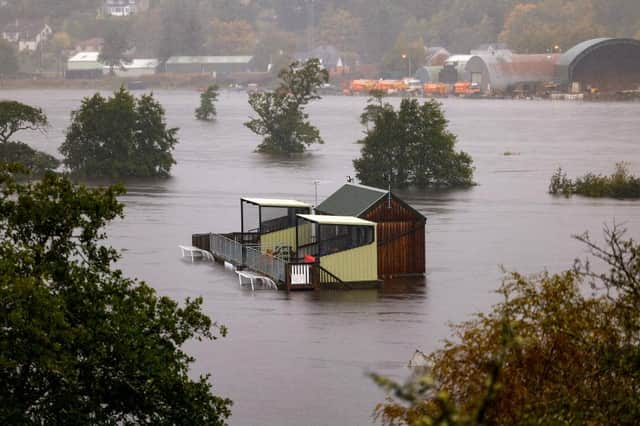Feumaidh a’ ghluasasd son dèiligeadh le blàthachadh na cruinne a bhith fèir


[English-language version below]
Cosgaidh e na ceudan de mhilleanan a chur ceart agus ann am Siorrachd Pheairt, dh’fhuilig iad an cosgais a bu mhotha; le fear a’ call a bheatha nuair a dh’fhalbh an sruth leis agus e a’ feuchainn ri dama hydro a chàradh.
Ann an Alba, leis a’ Chuan a Tuath air aon taobh agus an Cuan Siar air an taobh eile, tha sinn air ar cùmhnadh bhon bhuaidh as miosa a thig le droch thèintean, mar a tha aca ann an Astràilia, is California agus fiù ‘s ceann a deas na Roinn Eòrpa, ach bha an t-seachdain-sa na chuimhneachadh, ma bha e a dhìth, g’ eil sinn uile a’ dol a dh’fhulang bho bhuaidh blàthachadh na cruinne ann an dòigh a choireigin.
Advertisement
Hide AdAdvertisement
Hide AdTha an suidheachadh èiginneach, ach aig an aon àm, feumar dèanamh cinnteach nach e iadsan as miosa dheth a ghiùlaineas an t-uallach as motha airson cumail ris na targaidean. Feumaidh an gluasad gu modhan ùr a bhith fèir.
Chan eil an coltas an-dràsta gur ann mar sin a bhios. Mar eisimpleir, tha e deuchainneach smaoineachadh g’ eil companaidhean mòra a’ ceannach chreideasan carboin air oighreachdan na h-Alba agus g’ eil na h-oighreachdan sin an uair sin a’ faighinn airgid bhon Riaghaltas airson a’ mhòinteach aca a sgeadachadh. Chan eil càil fèir mu dheidhinn sin.
‘S an uair sin, tha sgeamaichean blàthachadh thaighean; an gnothach as cudromaiche nuair a thig gu bhith a’ geàrradh na tha sinn a’ cleachdadh de chumhachd am broinn an taighe. Ceart gu leòr, tha taic airgid ri fhaighinn airson ionsulaideadh is siostaman cumhachd ùra, ach glè thric ann an suidheachadh dùthchail, tha iad gun fheum.
Tha gu leòr a chuir a-steach nam pumpaichean teas adhair air a dhol air ais chun na h-ola bho nach robh iad ag obair mar bu chòir. An rud bho dheireadh a dh’fheumas seann dhaoine, no duine sam bith, ‘s e iomagain nach bi an dachaigh blàth gu leòr.
Tha a bhith a’ cur chraobhan air fearran todhrach, a-rithist le taic bhon sporan phoblach, math airson targaidean a choinneachadh, ach tha e a’ ciallachadh anns an ùine fhada nach fhaigh sinn air gu leòr dhen bhiadh againn fhèin àrach.
Tha ceistean cuideachd ag èirigh mu dè cho prataigeach ‘s a tha na càraichean dealain agus cìsean truallaidh sna bailtean mòra. ‘S e liosta fhada a tha ann.
Chan eil duine ann a chanas g’ eil dèiligeadh le blàthachadh na cruinne furasta dhan luchd-phoileataigs agus tha feum air gluasad air a’ chùis gu h-èiginneach.
Ach, anns a’ chabhaig airson feuchainn ri ar dleasdanasan a choileanadh, feumaidh sinn dèanamh cinnteach nach eil iadsan a tha a’ fulang gu leòr mar-thà tron àrdachadh anns na cosgaisean a bhith beò air am fàgail ann an suidheachadh nas miosa tro dhroch phoileasaidh is dìth cùraim. Chan eil sin idir fèir.
English-language version:
The images from across Scotland of the recent spate of flooding, with rivers turned into raging, boiling torrents, carried with them a sense of the apocalyptic, a reminder of man’s insignificance to the brutal forces of nature. The damage caused will leave a hefty bill and, in landlocked Perthshire, we saw the ultimate cost when a 77-year-old man was swept to his death, after slipping into a river while trying to repair a hydro-electric dam. Police said the rescue attempt was hampered by the “challenging conditions”.
In temperate Scotland, squeezed between the North Sea and the Atlantic, we may be spared the nightmare of the wildfires that we see elsewhere, in the Mediterranean, Australia and California, but the last week has served as another reminder, if it were needed, that there is no escape from the cataclysmic impact of climate change. While the sense of urgency is real, equally there is a need to ensure that the burden of the mitigating factors which are necessary to meet the 1.5-degree-Celsius global warming target set by the Paris climate agreement is not left at the door of those who can least afford it. A “just transition” must be exactly that.
However, the omens, so far, are not great. For example, allowing multinational oil companies to buy “carbon credits” on Scottish estates and then paying these estates out of the public purse for peatland restoration seems perverse, the antithesis of what most would regard as just. Then there’s insulation, probably the biggest factor in reducing the amount of household energy we burn.
True, there are grants and loans available for people to move to new heating systems, but in a rural context, where often the houses are older and conditions more extreme, they are next to useless. Many of those who have moved to air-source heat pumps in recent years, believing them to be the future, have now switched back to oil as they found them unworkable and unreliable. The last thing an elderly person, or anyone for that matter, needs is a worry their house won’t be warm enough.
Planting trees on good productive farmland, again paid for by the public purse, may be a quick fix for meeting certain targets, but will reduce our capacity for domestic food production and therefore prove counterproductive in the long run. Similarly, questions are emerging over the practicality of electric cars and low-emission zones. And so the list goes on…
No one will pretend that the climate challenge is in any way an easy fix for politicians and the urgency of action is staring us in the face. But in the headlong rush to address our responsibilities, we must ensure that the lives of those who are already suffering at the sharp end of the cost-of-living crisis are not made worse through the application of poor policy. In other words, “just transition” needs to be a lot more than political rhetoric.
Comments
Want to join the conversation? Please or to comment on this article.